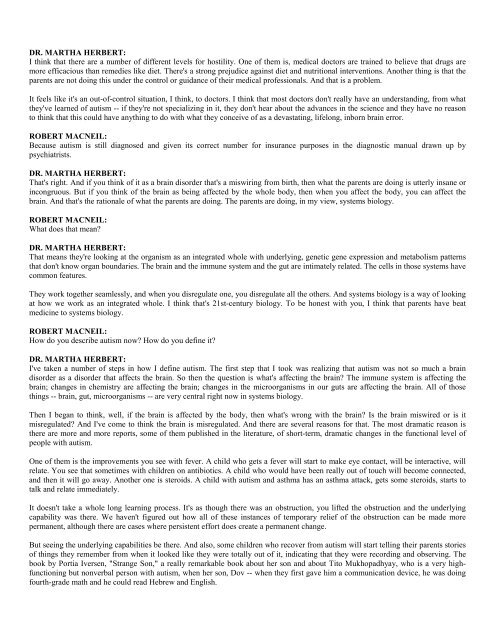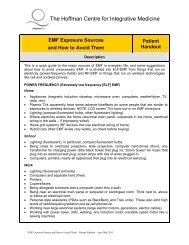PBS NEWSHOUR - Autism Now Interview with Dr. Martha Herbert
PBS NEWSHOUR - Autism Now Interview with Dr. Martha Herbert
PBS NEWSHOUR - Autism Now Interview with Dr. Martha Herbert
Create successful ePaper yourself
Turn your PDF publications into a flip-book with our unique Google optimized e-Paper software.
DR. MARTHA HERBERT:I think that there are a number of different levels for hostility. One of them is, medical doctors are trained to believe that drugs aremore efficacious than remedies like diet. There's a strong prejudice against diet and nutritional interventions. Another thing is that theparents are not doing this under the control or guidance of their medical professionals. And that is a problem.It feels like it's an out-of-control situation, I think, to doctors. I think that most doctors don't really have an understanding, from whatthey've learned of autism -- if they're not specializing in it, they don't hear about the advances in the science and they have no reasonto think that this could have anything to do <strong>with</strong> what they conceive of as a devastating, lifelong, inborn brain error.ROBERT MACNEIL:Because autism is still diagnosed and given its correct number for insurance purposes in the diagnostic manual drawn up bypsychiatrists.DR. MARTHA HERBERT:That's right. And if you think of it as a brain disorder that's a miswiring from birth, then what the parents are doing is utterly insane orincongruous. But if you think of the brain as being affected by the whole body, then when you affect the body, you can affect thebrain. And that's the rationale of what the parents are doing. The parents are doing, in my view, systems biology.ROBERT MACNEIL:What does that mean?DR. MARTHA HERBERT:That means they're looking at the organism as an integrated whole <strong>with</strong> underlying, genetic gene expression and metabolism patternsthat don't know organ boundaries. The brain and the immune system and the gut are intimately related. The cells in those systems havecommon features.They work together seamlessly, and when you disregulate one, you disregulate all the others. And systems biology is a way of lookingat how we work as an integrated whole. I think that's 21st-century biology. To be honest <strong>with</strong> you, I think that parents have beatmedicine to systems biology.ROBERT MACNEIL:How do you describe autism now? How do you define it?DR. MARTHA HERBERT:I've taken a number of steps in how I define autism. The first step that I took was realizing that autism was not so much a braindisorder as a disorder that affects the brain. So then the question is what's affecting the brain? The immune system is affecting thebrain; changes in chemistry are affecting the brain; changes in the microorganisms in our guts are affecting the brain. All of thosethings -- brain, gut, microorganisms -- are very central right now in systems biology.Then I began to think, well, if the brain is affected by the body, then what's wrong <strong>with</strong> the brain? Is the brain miswired or is itmisregulated? And I've come to think the brain is misregulated. And there are several reasons for that. The most dramatic reason isthere are more and more reports, some of them published in the literature, of short-term, dramatic changes in the functional level ofpeople <strong>with</strong> autism.One of them is the improvements you see <strong>with</strong> fever. A child who gets a fever will start to make eye contact, will be interactive, willrelate. You see that sometimes <strong>with</strong> children on antibiotics. A child who would have been really out of touch will become connected,and then it will go away. Another one is steroids. A child <strong>with</strong> autism and asthma has an asthma attack, gets some steroids, starts totalk and relate immediately.It doesn't take a whole long learning process. It's as though there was an obstruction, you lifted the obstruction and the underlyingcapability was there. We haven't figured out how all of these instances of temporary relief of the obstruction can be made morepermanent, although there are cases where persistent effort does create a permanent change.But seeing the underlying capabilities be there. And also, some children who recover from autism will start telling their parents storiesof things they remember from when it looked like they were totally out of it, indicating that they were recording and observing. Thebook by Portia Iversen, "Strange Son," a really remarkable book about her son and about Tito Mukhopadhyay, who is a very highfunctioningbut nonverbal person <strong>with</strong> autism, when her son, Dov -- when they first gave him a communication device, he was doingfourth-grade math and he could read Hebrew and English.



